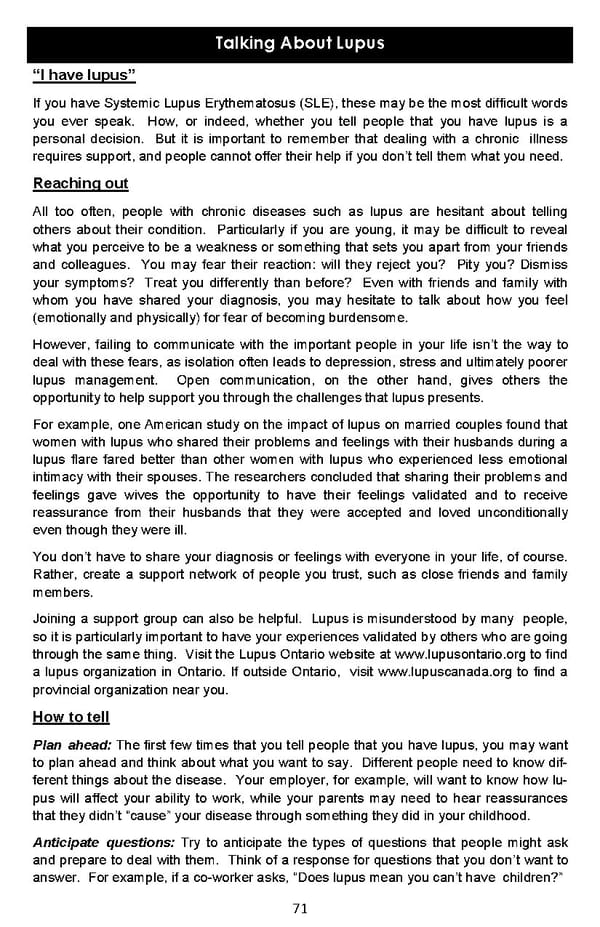Talking About Lupus “I have lupus” If you have Systemic Lupus Erythematosus (SLE), these may be the most difficult words you ever speak. How, or indeed, whether you tell people that you have lupus is a personal decision. But it is important to remember that dealing with a chronic illness requires support, and people cannot offer their help if you don’t tell them what you need. Reaching out All too often, people with chronic diseases such as lupus are hesitant about telling others about their condition. Particularly if you are young, it may be difficult to reveal what you perceive to be a weakness or something that sets you apart from your friends and colleagues. You may fear their reaction: will they reject you? Pity you? Dismiss your symptoms? Treat you differently than before? Even with friends and family with whom you have shared your diagnosis, you may hesitate to talk about how you feel (emotionally and physically) for fear of becoming burdensome. However, failing to communicate with the important people in your life isn’t the way to deal with these fears, as isolation often leads to depression, stress and ultimately poorer lupus management. Open communication, on the other hand, gives others the opportunity to help support you through the challenges that lupus presents. For example, one American study on the impact of lupus on married couples found that women with lupus who shared their problems and feelings with their husbands during a lupus flare fared better than other women with lupus who experienced less emotional intimacy with their spouses. The researchers concluded that sharing their problems and feelings gave wives the opportunity to have their feelings validated and to receive reassurance from their husbands that they were accepted and loved unconditionally even though they were ill. You don’t have to share your diagnosis or feelings with everyone in your life, of course. Rather, create a support network of people you trust, such as close friends and family members. Joining a support group can also be helpful. Lupus is misunderstood by many people, so it is particularly important to have your experiences validated by others who are going through the same thing. Visit the Lupus Ontario website at www.lupusontario.org to find a lupus organization in Ontario. If outside Ontario, visit www.lupuscanada.org to find a provincial organization near you. How to tell Plan ahead: The first few times that you tell people that you have lupus, you may want to plan ahead and think about what you want to say. Different people need to know dif- ferent things about the disease. Your employer, for example, will want to know how lu- pus will affect your ability to work, while your parents may need to hear reassurances that they didn’t “cause” your disease through something they did in your childhood. Anticipate questions: Try to anticipate the types of questions that people might ask and prepare to deal with them. Think of a response for questions that you don’t want to answer. For example, if a co-worker asks, “Does lupus mean you can’t have children?” 71
 Living Well With Lupus Facts Booklet Page 70 Page 72
Living Well With Lupus Facts Booklet Page 70 Page 72